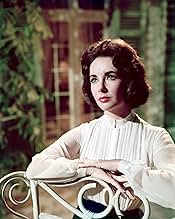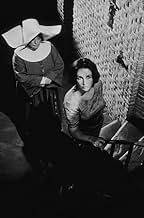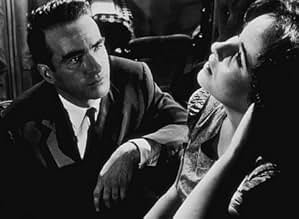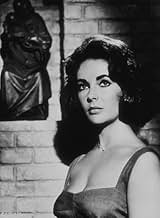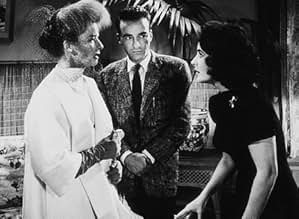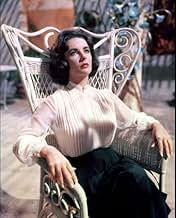IMDb-BEWERTUNG
7,5/10
18.325
IHRE BEWERTUNG
Ein Chirurg wird mit dem Fall einer jungen Frau beauftragt, deren Tante möchte, dass sie lobotomiert wird, um ein Familiengeheimnis zu verbergen.Ein Chirurg wird mit dem Fall einer jungen Frau beauftragt, deren Tante möchte, dass sie lobotomiert wird, um ein Familiengeheimnis zu verbergen.Ein Chirurg wird mit dem Fall einer jungen Frau beauftragt, deren Tante möchte, dass sie lobotomiert wird, um ein Familiengeheimnis zu verbergen.
- Für 3 Oscars nominiert
- 4 Gewinne & 7 Nominierungen insgesamt
Sheila Robins
- Dr. Hockstader's Secretary
- (as Sheila Robbins)
Erik Chitty
- Asylum Inmate
- (Nicht genannt)
Grace Denbeigh-Russell
- Asylum patient
- (Nicht genannt)
Brenda Dunrich
- Nurse
- (Nicht genannt)
Eddie Fisher
- Street Urchin
- (Nicht genannt)
Anthony Lang
- Inmate
- (Nicht genannt)
Aileen Lewis
- Nurse
- (Nicht genannt)
Empfohlene Bewertungen
New Orleans, 1937. Doctor Cukrowicz is summoned to the home of Violet Venable, he is encouraged to go by his father who sees a ripe opportunity to get a significant amount of funding directly out of the rich widow. Venable tells Cukrowicz of her niece, Catherine, who has been diagnosed as having a mental disease that causes her to have outbursts etc. She wants Cukrowicz to carry out a lobotomy on Kathryn without question. However Cukrowicz meets with Catherine and finds her trapped behind memories that she won't let herself remember. He tries to draw out whatever her stepmother is so desperate to have cut out.
I watched this with no prior knowledge of what it was about or any of the hidden themes that are brought out after viewing. I suspect I was able to come to it `clean' as a result. The plot starts simply and I wasn't sure where it was going. Then Mrs Venable is introduced and we learn of her desire to have Catherine lobotomised. This is followed by the question what happened to Sebastion (Venable's son) that has sent Catherine mad and sent Mrs Venable to the point where she wants to cut it out of her memory. This question looms large over the film and is very effective in driving the plot forward.
The clues are given all along to what a messed up situation the whole thing is and the final 15 minutes are powerful despite some weaknesses. The plot has talked up the romance part of the film between Catherine and Dr Cukrowicz, I assume to try and cover the unpleasant business and make it easier on a fifties audience, this takes away a little bit but didn't distract me too much from the central tale.
Hepburn is magnificent in her role and her opening scene does much to captivate you for the rest of the movie. Taylor is good but at times feels too polished to be in her character's predicament. Clift was too stale for me and didn't really stand out when placed beside these two actresses going hell for leather for their roles.
Overall I enjoyed this film. The tension of the central questions is built on well with mystery and dark secrets hinted at constantly. The underlying themes add to it but you don't lose anything if you don't see them and the dark secret is powerful and meaningful even if it must do well by the censors of the day. Glad I stumbled onto it.
I watched this with no prior knowledge of what it was about or any of the hidden themes that are brought out after viewing. I suspect I was able to come to it `clean' as a result. The plot starts simply and I wasn't sure where it was going. Then Mrs Venable is introduced and we learn of her desire to have Catherine lobotomised. This is followed by the question what happened to Sebastion (Venable's son) that has sent Catherine mad and sent Mrs Venable to the point where she wants to cut it out of her memory. This question looms large over the film and is very effective in driving the plot forward.
The clues are given all along to what a messed up situation the whole thing is and the final 15 minutes are powerful despite some weaknesses. The plot has talked up the romance part of the film between Catherine and Dr Cukrowicz, I assume to try and cover the unpleasant business and make it easier on a fifties audience, this takes away a little bit but didn't distract me too much from the central tale.
Hepburn is magnificent in her role and her opening scene does much to captivate you for the rest of the movie. Taylor is good but at times feels too polished to be in her character's predicament. Clift was too stale for me and didn't really stand out when placed beside these two actresses going hell for leather for their roles.
Overall I enjoyed this film. The tension of the central questions is built on well with mystery and dark secrets hinted at constantly. The underlying themes add to it but you don't lose anything if you don't see them and the dark secret is powerful and meaningful even if it must do well by the censors of the day. Glad I stumbled onto it.
This screen version, by Joseph L Mankiewicz, of Tennessee Williams' play isn't as highly thought of as it should be. It's not a classic and on occasions it comes over as crude and stilted, but it also has many fine things going for it. Although he never really opens it out, Mankiewicz gives it a fluency that isn't at all theatrical and although he often films scenes intimately and between only two characters, he ensures it is photographed and cut in a very cinematic fashion.
Unfortunately, one of the two people on screen during these 'cinematic' sequences is Montgomery Clift who is at his worst here. It was after his accident and he looks as if he's in pain. When he walks it's as if there is a board up his back and he talks as if out of the side of his mouth. Luckily, with him in these scenes is either Elizabeth Taylor or Katharine Hepburn or both and when they are on screen you don't pay too much attention to Clift.
Dilys Powell said Elizabeth Taylor was born to play Tennessee Williams and she was right. Indeed this may be her best performance after "Virginia Woolf". Catherine's lines don't have the kind of poetry in them that Violet Venable's does but Taylor finds a poetry of her own in her readings. She builds on her long speech at the end and is very moving, even if Mankiewicz can't resist 'showing' us, in flashbacks, what Taylor is telling us, as if he doesn't trust an audience to sit still and just listen to Taylor. (They would have to in the theatre).
As Violet, Hepburn has the showier part and she milks it for all it's worth. It's a great piece of acting because Violet never seems to be acting, though she tends to think of her life as a kind of performance, something she has passed on to her homosexual son, Sebastian. (If the old adage, 'my mother made me a homosexual', has any validity you don't have to look any further than here). She enters from above, descending in her small baroque lift, and Hepburn can see the comic potential in such an entrance. Moments later, however, she is recounting how the sea-turtles were devoured by flesh-eating birds in the Galapogos, and you can see just how dangerously unstable this woman really is.
Any film that has acting of this calibre automatically qualifies as worth seeking out, (you forgive the lame work of Clift and Gary Raymond and draw a blind over Mercedes McCambridge, though Albert Dekker is very fine), but this qualifies on other grounds; as one of the better Tennessee Williams adaptations, (he co-wrote it with Gore Vidal), as a flawed, dated but strangely fascinating example of how Hollywood viewed homosexuality at the time, (negatively, naturally, but any face, no matter how horribly distorted, so long as it was in the public gaze, was better than no face at all), and as a serious addition to the Joe Mankiewicz canon.
Unfortunately, one of the two people on screen during these 'cinematic' sequences is Montgomery Clift who is at his worst here. It was after his accident and he looks as if he's in pain. When he walks it's as if there is a board up his back and he talks as if out of the side of his mouth. Luckily, with him in these scenes is either Elizabeth Taylor or Katharine Hepburn or both and when they are on screen you don't pay too much attention to Clift.
Dilys Powell said Elizabeth Taylor was born to play Tennessee Williams and she was right. Indeed this may be her best performance after "Virginia Woolf". Catherine's lines don't have the kind of poetry in them that Violet Venable's does but Taylor finds a poetry of her own in her readings. She builds on her long speech at the end and is very moving, even if Mankiewicz can't resist 'showing' us, in flashbacks, what Taylor is telling us, as if he doesn't trust an audience to sit still and just listen to Taylor. (They would have to in the theatre).
As Violet, Hepburn has the showier part and she milks it for all it's worth. It's a great piece of acting because Violet never seems to be acting, though she tends to think of her life as a kind of performance, something she has passed on to her homosexual son, Sebastian. (If the old adage, 'my mother made me a homosexual', has any validity you don't have to look any further than here). She enters from above, descending in her small baroque lift, and Hepburn can see the comic potential in such an entrance. Moments later, however, she is recounting how the sea-turtles were devoured by flesh-eating birds in the Galapogos, and you can see just how dangerously unstable this woman really is.
Any film that has acting of this calibre automatically qualifies as worth seeking out, (you forgive the lame work of Clift and Gary Raymond and draw a blind over Mercedes McCambridge, though Albert Dekker is very fine), but this qualifies on other grounds; as one of the better Tennessee Williams adaptations, (he co-wrote it with Gore Vidal), as a flawed, dated but strangely fascinating example of how Hollywood viewed homosexuality at the time, (negatively, naturally, but any face, no matter how horribly distorted, so long as it was in the public gaze, was better than no face at all), and as a serious addition to the Joe Mankiewicz canon.
10robb_772
Long-fabled as one of the most bizarre films to come out Hollywood during the years of the Production Code's strict enforcement, SUDDENLY, LAST SUMMER is a riveting psychological drama that remains absolutely gut-wrenching even after nearly fifty years since it's original release. Screenwriter Gore Vidal takes Tennessee Williams' one-act play and runs with it, fleshing out the central characters and expanding the story's central arc. Vidal had the seemingly impossibly task of taking a tale involving homosexuality, incest, pedophilia, and even cannibalism and presenting it all in a manner that would be acceptable to the rigid Production Code, yet still coherent to the average film audience. Not only did Vidal succeed victoriously, but the slightly ambiguous nature of the film's climax and denouncement actually makes the twice as unsettling and disturbing.
With relatively few characters to populate the story the performances are absolutely crucial, and the tight-knit cast delivers the goods in spades. Long after many of her acting contemporaries of the thirties and forties had been forgotten, Katharine Hepburn continued to reign supreme on the silver screen and her sublime performance as the manipulative and cunning Mrs. Venable ranks among Hepburn's best work of the decade. The wounded vulnerability of a post-car accident Montgomery Clift serves him well in a difficult role as the middle man between the film's leading ladies, and the still-handsome actor provides a humane, completely genuine performance that supplies viewers with level-headed window into the off-kilter story. Albert Dekker, Mercedes McCambridge and Gary Raymond also excel in minor roles.
The film's biggest surprise, however, is the exceptional portrayal of Elizabeth Taylor in the film's central performance. Although usually somewhat of an uneven actress, Taylor completely nails a dauntingly difficult role in a complex, multilayered performance that deservedly won her a Golden Globe Award as well as her third consecutive Oscar nomination. During the film's climatic revelation, Taylor lets out a series of bone-chilling screams that I could never imagine coming out of any other actress. Not only does it remain Taylor's finest performance (which is a considerable achievement when one considers that WHO'S AFRAID OF VIRGINIA WOOLF is also on her resume), but it is also a performance that simply could not be bettered.
Although perhaps he could never surpass 1949's A LETTER TO THREE WIVES or 1950's ALL ABOUT EVE in the eyes of most viewers, SUMMER contains some of the finest work of director Joseph L. Mankiewicz' legendary career. Brilliantly combining southern Gothicism with straight-faced psychodrama and even grandiose horror, Mankiewicz stitches the various seemingly disparate threads together in a harrowing, yet perversely satisfying whole. Even the lengthy, sometimes criticized flashback sequence is an absolute tour de force of film-making that leaves viewers emotionally exhausted as one experiences the on screen turmoil more than simply watching it. An often unheralded classic, the film remains of the most sorely underrated films of its era.
With relatively few characters to populate the story the performances are absolutely crucial, and the tight-knit cast delivers the goods in spades. Long after many of her acting contemporaries of the thirties and forties had been forgotten, Katharine Hepburn continued to reign supreme on the silver screen and her sublime performance as the manipulative and cunning Mrs. Venable ranks among Hepburn's best work of the decade. The wounded vulnerability of a post-car accident Montgomery Clift serves him well in a difficult role as the middle man between the film's leading ladies, and the still-handsome actor provides a humane, completely genuine performance that supplies viewers with level-headed window into the off-kilter story. Albert Dekker, Mercedes McCambridge and Gary Raymond also excel in minor roles.
The film's biggest surprise, however, is the exceptional portrayal of Elizabeth Taylor in the film's central performance. Although usually somewhat of an uneven actress, Taylor completely nails a dauntingly difficult role in a complex, multilayered performance that deservedly won her a Golden Globe Award as well as her third consecutive Oscar nomination. During the film's climatic revelation, Taylor lets out a series of bone-chilling screams that I could never imagine coming out of any other actress. Not only does it remain Taylor's finest performance (which is a considerable achievement when one considers that WHO'S AFRAID OF VIRGINIA WOOLF is also on her resume), but it is also a performance that simply could not be bettered.
Although perhaps he could never surpass 1949's A LETTER TO THREE WIVES or 1950's ALL ABOUT EVE in the eyes of most viewers, SUMMER contains some of the finest work of director Joseph L. Mankiewicz' legendary career. Brilliantly combining southern Gothicism with straight-faced psychodrama and even grandiose horror, Mankiewicz stitches the various seemingly disparate threads together in a harrowing, yet perversely satisfying whole. Even the lengthy, sometimes criticized flashback sequence is an absolute tour de force of film-making that leaves viewers emotionally exhausted as one experiences the on screen turmoil more than simply watching it. An often unheralded classic, the film remains of the most sorely underrated films of its era.
"Suddenly, Last Summer" brought Elizabeth Taylor her third Oscar nomination, and she probably should have won (though winner Simone Signoret's performance in "Room at the Top" was also outstanding). Taylor is awesome in this film ----- most notably in the final twenty minutes, which she virtually dominates. This entire scene was reportedly shot in one take, which makes sense, since the character begins with a narrative and gradually builds to an emotionally shattering climax. Taylor's previous film, "Cat on a Hot Tin Roof", was also Oscar caliber, but this performance is even more impressive. The 1960 Oscar for "Butterfield 8" was probably a consolation prize for the Oscar she should have received for either of these two previous films.
In 1930's New Orleans, a wealthy and eccentric older woman named Mrs. Venable (Katharine Hepburn), wants a surgeon (Montgomery Clift) to perform a lobotomy on her niece (Elizabeth Taylor), for reasons that become clear toward the end of the film. This macabre Tennessee Williams story, with overlapping adult themes, must surely have been a shock to audiences in 1959. The film provides a great vehicle for the talents of both Hepburn whose acting is engaging, and Taylor whose performance is superb.
The Mankiewicz script is very talky. The characters of both Hepburn and Taylor engage in lengthy and at times tedious monologues. In all that talking, at least there are some really good lines. My favorite is near the beginning. In a nonchalant tone, Mrs. Venable tells us about the daily vicissitudes of Lady, the Venus flytrap that Mrs. Venable keeps in her garden. "Lady must be kept under glass, and while she is under glass, we have to provide her with flies, flown in at great expense." Priceless.
As one would expect for a film derived from a stage play, cinematography and music are less important than dialogue and acting. "Suddenly Last Summer" is worth viewing for its unusual story, and for the acting accomplishments of Hepburn and Taylor.
The Mankiewicz script is very talky. The characters of both Hepburn and Taylor engage in lengthy and at times tedious monologues. In all that talking, at least there are some really good lines. My favorite is near the beginning. In a nonchalant tone, Mrs. Venable tells us about the daily vicissitudes of Lady, the Venus flytrap that Mrs. Venable keeps in her garden. "Lady must be kept under glass, and while she is under glass, we have to provide her with flies, flown in at great expense." Priceless.
As one would expect for a film derived from a stage play, cinematography and music are less important than dialogue and acting. "Suddenly Last Summer" is worth viewing for its unusual story, and for the acting accomplishments of Hepburn and Taylor.
Wusstest du schon
- WissenswertesAccording to author Garson Kanin in his memoir "Tracy and Hepburn," Katharine Hepburn was reportedly so furious at the way Montgomery Clift was treated by producer Sam Spiegel and director Joseph L. Mankiewicz during filming that, after making sure that she would not be needed for retakes, she told both men off and actually spat at them (although it remains unclear just which one of the two she spat at, or if she spat at both).
- PatzerAlthough set in 1937, costumes, hairstyles and makeup worn by Dame Elizabeth Taylor are all contemporary in 1959.
- Zitate
Catherine Holly: Is that what love is? Using people? And maybe that's what hate is - not being able to use people.
- VerbindungenEdited into Michael Jackson's This Is It (2009)
Top-Auswahl
Melde dich zum Bewerten an und greife auf die Watchlist für personalisierte Empfehlungen zu.
Details
- Erscheinungsdatum
- Herkunftsländer
- Sprache
- Auch bekannt als
- De repente en el verano
- Drehorte
- Begur, Girona, Catalonia, Spanien(village and old castle scenes)
- Produktionsfirmen
- Weitere beteiligte Unternehmen bei IMDbPro anzeigen
Box Office
- Budget
- 3.000.000 $ (geschätzt)
- Weltweiter Bruttoertrag
- 9.830 $
- Laufzeit1 Stunde 54 Minuten
- Farbe
- Seitenverhältnis
- 1.85 : 1
Zu dieser Seite beitragen
Bearbeitung vorschlagen oder fehlenden Inhalt hinzufügen

Oberste Lücke
By what name was Plötzlich im letzten Sommer (1959) officially released in India in English?
Antwort


